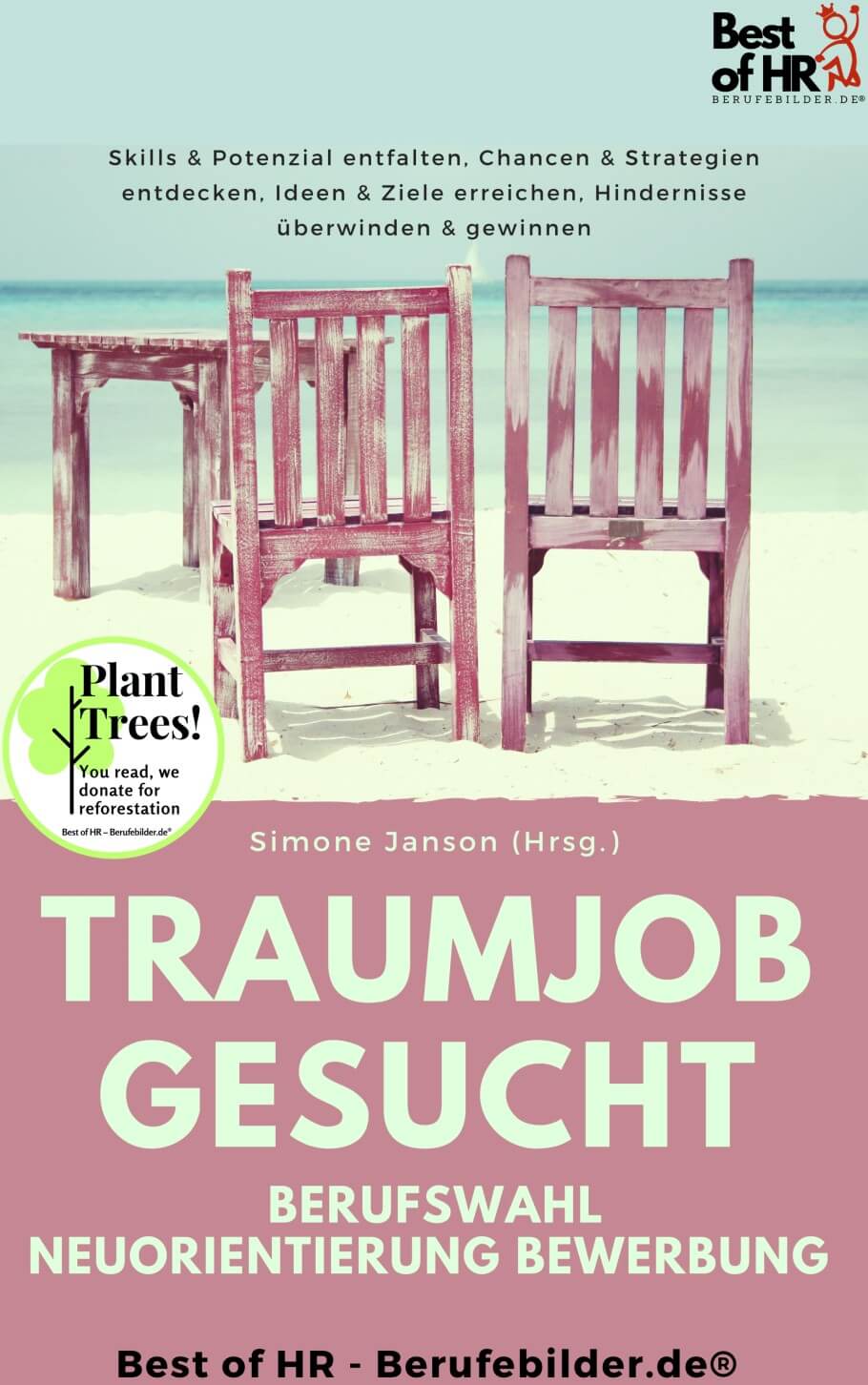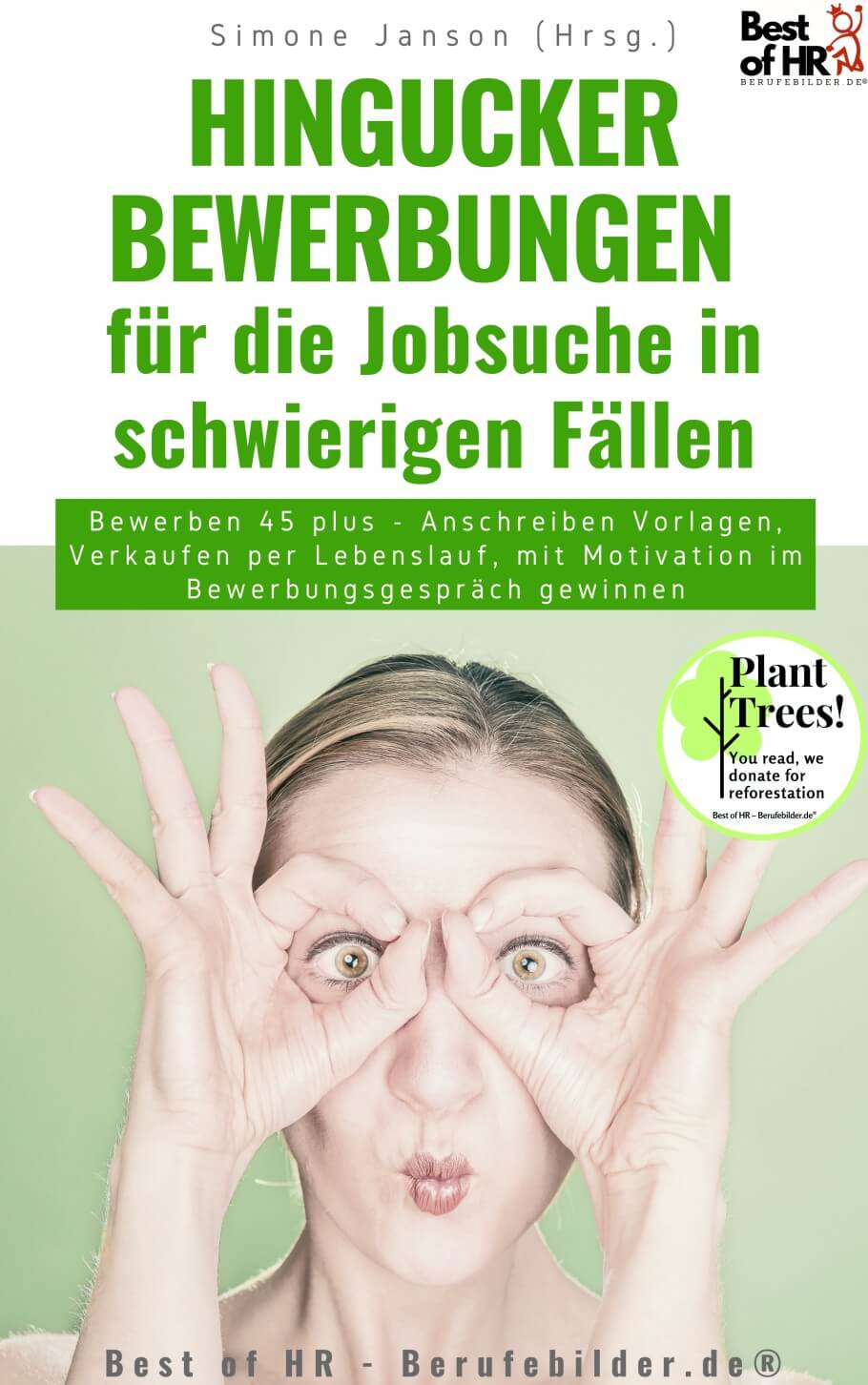For their successful, good life Information you really need: Government-funded publisher, awarded the Global Business Award as Publisher of the Year: Books, Shops, eCourses, data-driven AI-Services. Print and online publications as well as the latest technology go hand in hand - with over 20 years of experience, partners like this Federal Ministry of Education, customers like Samsung, DELL, Telekom or universities. behind it Simone Janson, German Top 10 blogger, referenced in ARD, FAZ, ZEIT, WELT, Wikipedia.
Disclosure & Copyright: Image material created by Verlag Best of HR – Berufebilder.de®.
Job profile! Culture Communication Science Management: Application for job search & everyday work
By Simone Janson (More) • Last updated on October 21.05.2021, XNUMX • First published on 21.05.2021/XNUMX/XNUMX • So far 842ß readers, 3716 social media shares Likes & Reviews (5 / 5) • Read & write comments
Follow your inclinations in your dream job – many people dream of that Study start in the arts or humanities. But is such a study useful?

- From the desired study to the dream job?
- Child, do something clever
- Successful as a freelance artist
- What to do in case of legal problems
- The network counts
- Art only takes up 50 percent
- As an archaeologist in science management
- Work at college
- From Political Scientist to Social Network
- Social media is more than just a means of communication
- Networking to a dream job
- Labor market and future perspectives in numbers
- The truth behind the statistics
- There are perspectives
- Top books on the subject
- Read text as PDF
- Advice on success, goal achievement or marketing
- Book eCourse on Demand
- Skate eBook as desired
From the desired study to the dream job?
Humanities scholars - idealistic, foreign and unsuitable for the job market! With such prejudices from parents, teachers and sometimes even your own Professoren students in subjects such as German studies, history, philosophy or sociology often have to struggle. Because the motivation to study and career prospects are often anything but clear, the dream job just doesn't wait on a silver platter, and personal initiative is required. But humanities graduates can also get fit for the job at an early stage, and how to specifically look for opportunities and their own profile for them Working world sharpens.
Many dream of a course of study that should primarily correspond to their personal inclinations and abilities. The secure existence and the amount of income are of secondary importance. Are humanities and cultural studies the right one Choice?
Child, do something clever
The books on the subject (advertising)
Whether the desired course of study will later be a successful one career entry and the basis for a secure professional existence is initially of secondary importance when choosing this course. Personal freedom is more important than security and a strong identification with the subject is more important than a high level Income. In particular, theCourses in the areas Art-, humanities and social sciences has the image of a merciless art that almost inevitably leads to insecure, badly paid and often only temporary jobs.
However, those who start studying in these fields despite the usual advice and warnings (“Child, study something clever”) are not necessarily going down a one-way street: some make it despite all the adversities circumstancesto live from their dream job. Others seek and find alternatives in related fields of activity at an early stage. And still others discover completely new career opportunities in a roundabout way, far from the originally planned ones.
It's really easy Job Search for anyone who wants to work in these areas. In addition, there is often a lack of a realistic picture of the labor market and the knowledge of what is important when starting a career. Which expectations are realistic, which can only fail, and what can be done to ensure that the dream of a job does not inevitably become an unprofitable art?
Successful as a freelance artist
One that has made it is Carola Rümperer: She works as a visual artist in her own studio in Berlin-Marzahn. But simply, she admits, the way was not. Especially the study of art, which she completed in Osnabrück and Enschede, she had insufficiently prepared for her job as an artist:
“During my studies I mainly learned art styles and techniques. However, it was not clear to me that I would later work independently and what that meant - for example, dealing with insurance, legal and tax issues. Or that I have to market myself and therefore have to approach people, ”
Carola laments the omissions of her Vocational Training. After completing his studies, he therefore looked for a tax consultant and joined the trade union ver.di. They offer members legal advice and protection, among other things, when it comes to membership in the cheap artists' social insurance or Ask the pension insurance goes.
What to do in case of legal problems
Discounts for your success (advertising)!
But the union also once helped Carola take action when her work was illegally used for promotional purposes. Carola found it far more difficult to establish herself as an artist on the market:
“The most important thing as an artist is to stand out and stand out – because the competition is fierce. This works by creating your own profile, repeatedly applying for grants, organizing exhibitions, having catalogs printed, making contacts and initiating your own projects. Of course, all this is very complex, takes time, Money – and it can take many years to get there Success has."
At first, Carola didn't even know how to start. She therefore first sought advice in artist magazines such as Atelier. Today with the Internet It's easier: The Federal Association of Visual Artists eV and the Association of Associations of Artists and Art Sponsors eV, for example, provide information about competitions, calls for applications and current events as well as numerous contact addresses on their websites. Social networks such as Xing or Fac offer another way of finding out and exchanging informationebook, which Carola finds too unspecific. Local contacts, for example with potential sponsors, local politicians or foundations, are much more important for the Berlin artist Financing decide.
The network counts
But also that Contact to other artists with whom Carola can exchange creative ideas is necessary. Carola therefore runs her studio together with a photographer. Her artistic unique selling point are the Rümperiens, mythical creatures with black skin, which the artist has known since childhood in the North German lowlands and is now recreating - one Idea, which has already won her numerous scholarships, including in Egypt and Russia. And she also got the current studio in Berlin-Marzahn as part of a funding program.
For something like this to work, however, lengthy application processes are necessary, because state and municipal funds are very scarce, especially in Berlin: Carola therefore has to write downright financing plans for some applications. She is currently preparing a catalogue, the printing of which is subsidized by the cultural office; around Costs To save money, Carola will lay it out herself - which means that she also had to familiarize herself with software programs such as Photoshop.
Art only takes up 50 percent
“In the end, real work as an artist - creative in the studio - only takes up a maximum of 50 percent of everyday work. The rest of the time is spent on bureaucracy, computer work, finding sponsors, organizing projects and maintaining contacts. ”
Carola Rümperer clears up misconceptions. Also Carola as before for sure is that she has found her dream job in art, she advises young people People with artistic ambitions to carefully review their career aspirations:
“As an artist you very often live close to subsistence level. Therefore, you should think about how you can secure yourself financially at an early stage. You should also think about family planning and pension provision in good time. Precisely because one's own interests often change in the course of life, it can make sense to look for alternatives in similar professions that may be better paid. "
As an archaeologist in science management
Find alternatives on time - Nadine Chmura took this advice to heart. She studied Classical Archeology, Ethnology and Islamic Art History at the University of Bonn and is now a Graduate Center for Humanities and Social Sciences. It was clear to her early on that a classic, scientific career was out of the question for her:
Find alternatives on time - have this advice Dr. Nadine Chmura takes heed. She studied Classical Archeology, Ethnology and Islamic Art History at the University of Bonn and today heads the Graduate Center for Humanities and Social Sciences. It was clear to her early on that a classical, scientific career was out of the question for her:
“Some former fellow students work their way up to habilitation as academic Employees from one temporary position to the next and then make ends meet with badly paid substitute professorships in the hope of getting a regular professorship at a university. In orchid subjects such as archaeology, in particular, there are simply not enough places for this. This path was therefore simply too risky for me.”
explains Nadine Chmura. Instead, she worked in the House of History, as an editorial staff member Online-portal meinestadt.de, at Bernstein-Verlag in Bonn, was a tour guide or did data collection and project work for a consulting company-Companys.
Work at college
She has also worked for various university institutions such as the Laboratory for Experimental Economic Research, University of Bonn or the School of Economics at Shanghai-Jiao Tong University.
“I tried out all the classic professional fields for humanities scholars: museum, media, publisher, university. In the end, I was simply most interested in science management: at the latest with my master's thesis it was clear to me that I would take this direction. ”
explains Nadine Chmura. To her Objective In addition to her doctorate in archeology, she accepted a position as a research assistant at the University of Marburg, where she organized events and managed press and public relations, among other things. After only one year, she became managing director and is now also the coordinator of EcoSkills - Economic and Business Soft Skills, a project funded by the European Social Funds. Getting started was not difficult for her:
“Since I have organizational tasks and I already had work experience, it is comparative for me light fallen to find a job. Especially since science management is still a very Boy Industry is. In my case, however, the basic requirement was a doctorate.”
explains Nadine Chmura and mentions another important prerequisite: Management experience and budget responsibility, which has been a common thread in all her previous jobs: Nadine was responsible for the Living Virtual Museum Online project in the House of History and looked after the Bernstein -Publishing the performances at the Frankfurt Book Fair. Since 2006 she has also been President of the Deutsche Kafka Society, which she co-founded.Society and has organized numerous international conferences and exhibitions in this context. She therefore advises students to gain as much work experience as possible:
“You can also finance your studies with scholarships or BAföG. However, if you work, you will gain more experience that will help you later! ”
From Political Scientist to Social Network
Experience and enthusiasm were also the key to success for Johannes Lenz: he is a Digital Consultant Corporate Communications responsible for internal and external Communication the Düsseldorf advertising agency Gray. For a long time, it didn't look like a creative profession for him: After studying politics and diploma administration, Johannes initially wanted to get into scientific political consulting in a very classic way. However, despite relevant internships in embassies and companies in Germany and abroad, that did not really work out. Even with the focus on public relations in the non-profit sector, with a focus on the EU and Eastern Europe, the graduate did not get any further, despite previous experience.
“At that time I wrote over 150 applications and also did some interviews, in which I was attested that I was just too close to the university. Overall, a pretty frustrating time, ”
John looks back today. The turning point was an eight-month internship at the BMW Group's headquarters. Even if BMW didn't offer him a job, Johannes came into contact with social media for the first time in his life. And caught fire. Because blogging, Twitter, Facebook and Co. are far more than just new means of communication for him:
“It is an attitude to life that is characterized by openness, fairness and willingness to help. Actually, of course, you think, but maybe this matter of course has arrived on the net faster than in real life. ”
This enthusiasm carried over to his Application: After just one month, he was accepted by alma mater, a recruitment agency and careers consultancy, for an eighteen-month traineeship in corporate communications and online Marketing. The range of tasks was wide-ranging, from creating newsletters to marketing messages, writing press releases, website maintenance, contact initiation and support through to trade fair and conference visits. But Johannes was curious about new things and wanted more:
“In the middle of the economic crisis, I convinced mine Executivewho made me work almost independently and on my own responsibility to represent alma mater in public and especially on the Internet. This went hand in hand with the integration of the social web, in particular the development of social media (Twitter and Co.) for corporate communication. "
Even if the alma mater would have liked to take on the social media enthusiast – Johannes Lenz wanted new ones after the traineeship ways tread. And this time he decided to do without classic applications and to use Web 2.0 to find a new job - one that suited him perfectly:
“For me, looking for a job via the social web nowadays means positioning yourself according to your skills and interests. That means creating selected social profiles that are updated regularly, seeking exchange and dialogue with other users and, in doing so, Humour not to verlieren. You also have to dare something, be open, approach others, not just take, but also give.”
Networking to a dream job
Through the diverse web activities, Gray became a political scientist I aufmerksam – and invited him to one Lecture through social media and businesses. With great success:
"The Resonance was very good. There was also a first meeting with the management and other employees. After that, contact with some employees intensified via Twitter, Facebook and Co. so far that it becomes an invitation to a job interview came. I've also been asked to give one or the other assessment of projects related to the social web."
Today Johannes Lenz has the job he wanted: He works in the thematic triangle of PR, corporate communications and Web 2.0. He tweets, blogs, networks, attends conferences, develops concepts and Strategies and tries to pass on the spirit of the social web. And he can contribute himself and his ideas. He therefore advises students to exhaust all available opportunities when looking for a job:
“You should try every day to develop yourself through your own curiosity. Approach the matter with enthusiasm and also in the event of setbacks Optimism not lose."
Labor market and future perspectives in numbers
Last year, the Institute for Labor Market and Vocational Research dedicated a book in its IAB Library series to “Job Market Opportunities for Humanities Scholars”. The authors provide a detailed statistical analysis, but also show the Problems that exist with exact statistics in this area:
According to the Federal Statistical Office, more than 60.000 graduates of humanities or art studies graduated from German universities each year. Since the number of undergraduates in these subjects has dropped in recent years, the Conference of Ministers of Education from 2013 also assumes a decline in the number of graduates. However, there are only vague numbers regarding the whereabouts of these graduates on the labor market: job-specific unemployment rates are calculated by linking employment statistics and unemployment statistics. This means that in the unemployment statistics only those who are looking for a job in this field are found. Conversely, for example, a Germanist who generally looks for a teaching job or employment as a lecturer, would not even be attributed to a profession-specific group. Since 2005, some of the jobseekers also receive unemployment benefit II and are therefore no longer included in unemployment statistics.
This is the only way to explain the comparatively low unemployment figures that the IAB reports every two years in its publication “Berufe im Spiegel the statistics. " identifies. In 2009, 44.878 people were looking for a job in the media, humanities and artistic professions. In contrast, there were 278.061 employees subject to social security contributions. For comparison: 682.384 employees subject to social security contributions were counted among engineers in the same period, but only 25.321 unemployed.
The truth behind the statistics
In addition, the authors of the IAB also find some indications that the situation among humanities scholars is actually even more difficult. An analysis of the microcensus shows that of the humanities, cultural and social scientists who are subject to social insurance contributions, over 13 percent were in temporary employment - for other academics it was only 11,5 percent. More than 28 percent worked part-time (other academics 17 percent). Over 23 percent stated that they could not find a corresponding full-time job, another 9 percent work because of parallel training or Further Training part-time, more than 7 percent to practice even a marginal job of 400 euros a month or less (other academics 4 percent), three quarters even as the only source of income.
Up to 19 percent (unfortunately no precise surveys are available here) of humanities and cultural studies scholars work independently, often due to a lack of professional experience Alternatives and in a mix of different forms of acquisition. No wonder that the graduates of these subject groups on average less to earn: The median of the net income here is between 1.700 and 2.000 euros per month, if you only take full-time employment as a basis, it is 2.000 to 2.300. For comparison: Academics from other groups receive a monthly average of 2.300 to 2.600 euros net.
There are perspectives
Nevertheless: As the three examples above show, the prospects in the humanities and cultural studies are by no means as bad as these figures suggest: Qualified and knowledge-oriented professions are increasingly gaining ground as a result of changes in the working world Significance. The authors of the IAB expect that 2020 new jobs will be needed by 200.000 in the media, humanities and artists professions – even if it is certainly not entirely clear how these jobs will then be structured and paid for. But the authors also say clear:
“However, humanities scholars, cultural scholars and social scientists should not wait for their underestimated innovation potential to be exploited by the Economy is finally noticed, but instead actively market themselves. Undoubtedly one would be Welt less humanitarian without the humanities, cultural and social sciences. But whoever reads the ABC of mankind in Future If you want to preserve it, you have to prove that you can take your place in working society yourself.”
Top books on the subject
Read text as PDF
Acquire this text as a PDF (only for own use without passing it on according to Terms and conditions): Please send us one after purchase eMail with the desired title supportberufebilder.de, we will then send the PDF to you immediately. You can also purchase text series.
4,99€Buy
Advice on success, goal achievement or marketing
Do you have questions about careers, Recruiting, personal development or increasing reach? Our AI consultant will help you for 5 euros a month – free for book buyers. We offer special ones for other topics IT services
5,00€ / per month Book
Book eCourse on Demand
Up to 30 lessons with 4 learning tasks each + final lesson as a PDF download. Please send us one after purchase eMail with the desired title supportberufebilder.de. Alternatively, we would be happy to put your course together for you or offer you a personal, regular one eMail-Course - all further information!
29,99€Buy
Skate eBook as desired
If our store doesn't offer you your desired topic: We will be happy to put together a book according to your wishes and deliver it in a format of your choice. Please sign us after purchase supportberufebilder.de
79,99€Buy
Here writes for you
 Simone Janson is publisher, Consultant and one of the 10 most important German bloggers Blogger Relevance Index. She is also head of the Institute's job pictures Yourweb, with which she donates money for sustainable projects. According to ZEIT owns her trademarked blog Best of HR – Berufebilder.de® to the most important blogs for careers, professions and the world of work. More about her im Career. All texts by Simone Janson.
Simone Janson is publisher, Consultant and one of the 10 most important German bloggers Blogger Relevance Index. She is also head of the Institute's job pictures Yourweb, with which she donates money for sustainable projects. According to ZEIT owns her trademarked blog Best of HR – Berufebilder.de® to the most important blogs for careers, professions and the world of work. More about her im Career. All texts by Simone Janson.



















Post a Comment